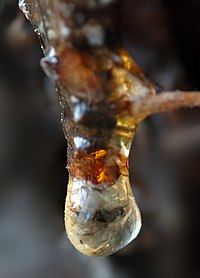
Photo from wikipedia
Propolis is known for its biological properties and its preparations have been continuously investigated in an attempt to solve the problem of their standardization, an issue that limits the use… Click to show full abstract
Propolis is known for its biological properties and its preparations have been continuously investigated in an attempt to solve the problem of their standardization, an issue that limits the use of propolis in food and pharmaceutical industries. The aim of this study was to evaluate in vitro antioxidant, antimicrobial, antiparasitic, and cytotoxic effects of extracts of red, green, and brown propolis from different regions of Brazil, obtained by ethanolic and supercritical extraction methods. We found that propolis extracts obtained by both these methods showed concentration-dependent antioxidant activity. The extracts obtained by ethanolic extraction showed higher antioxidant activity than that shown by the extracts obtained by supercritical extraction. Ethanolic extracts of red propolis exhibited up to 98% of the maximum antioxidant activity at the highest extract concentration. Red propolis extracts obtained by ethanolic and supercritical methods showed the highest levels of antimicrobial activity against several bacteria. Most extracts demonstrated antimicrobial activity against Staphylococcus aureus. None of the extracts analyzed showed activity against Escherichia coli or Candida albicans. An inhibitory effect of all tested ethanolic extracts on the growth of Trypanosoma cruzi Y strain epimastigotes was observed in the first 24 h. However, after 96 h, a persistent inhibitory effect was detected only for red propolis samples. Only ethanolic extracts of red propolis samples R01Et.B2 and R02Et.B2 showed a cytotoxic effect against all four cancer cell lines tested (HL-60, HCT-116, OVCAR-8, and SF-295), indicating that red propolis extracts have great cytotoxic potential. The biological effects of ethanolic extracts of red propolis revealed in the present study suggest that red propolis can be a potential alternative therapeutic treatment against Chagas disease and some types of cancer, although high activity of red propolis in vitro needs to be confirmed by future in vivo investigations.
Journal Title: PLoS ONE
Year Published: 2017
Link to full text (if available)
Share on Social Media: Sign Up to like & get
recommendations!